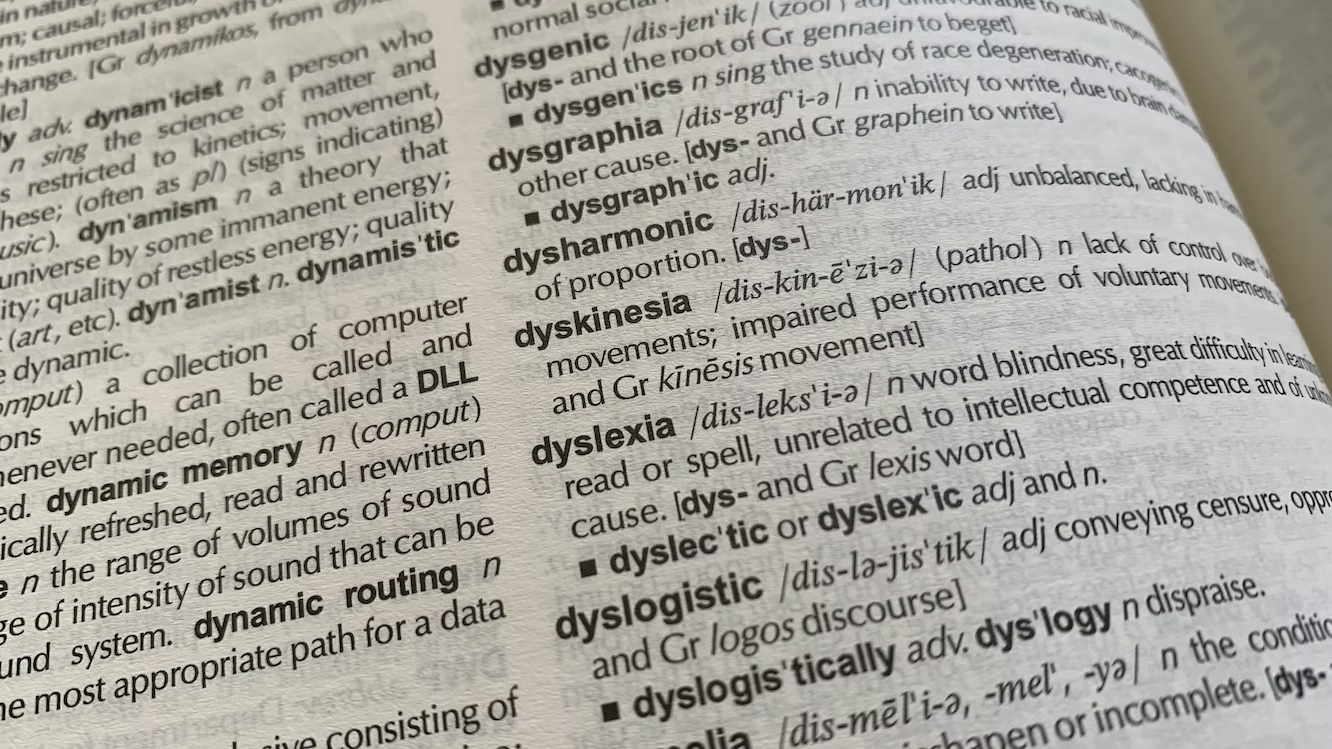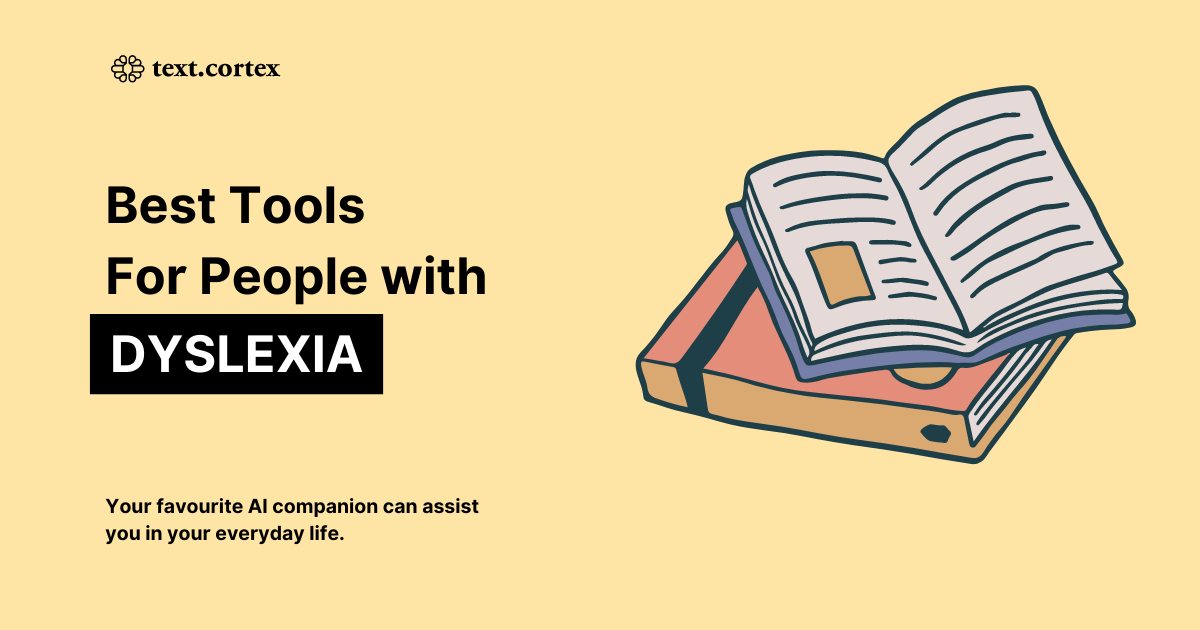It is estimated that 1 out of 10 people have dyslexia, which is a common learning difficulty that mainly affects reading, writing and spelling.
While this condition can make learning and writing quite difficult, it does not have to be a barrier to success: with proper diagnosis and intervention, people with dyslexia can overcome their challenges and lead successful lives.
In this article we explain what learning difficulties are with a specific section dedicated to dyslexia, explore the challenges that individuals affected by it have to face on a daily basis and, finally, we’ll provide a list with some tools that will be useful to people dealing with dyslexia.
Ready? Let’s start!
What is a Learning Difficulty?
A learning difficulty is defined as a disorder that affects the ability to either interpret what is heard or seen, or to link information from different parts of the brain. It can also affect memory and the ability of the brain to store and retrieve information.

Learning Disabilities and Learning Disorders
While learning disability and learning disorder are often used interchangeably, they differ in many ways. Significant educational difficulties in an academic setting are referred to as disorder. These issues, however, are often not enough to get a formal diagnosis. Learning disability, on the other hand, is a medical term used to describe a condition in which an individual meets certain specific criteria, as evaluated by a specialist.
The difference between the two lies in the severity, occurrence, and intensity of reported symptoms, and thus should not be confused.
4 Types of Learning Difficulties
- Dyslexia: the most prevalent form of dyslexia is phonological, which affects how individuals separate words into their component parts.
- Attention difficulties: can be classified as either attention deficit disorder (ADD) or attention deficit hyperactivity disorder (ADHD).
- Dysgraphia: impairs the capability to compose, chiefly in terms of handwriting, but also in terms of organization.
- Dyscalculia: in contrast to language-related learning challenges such as dyslexia and dysgraphia, dyscalculia is associated with difficulty in processing numbers.
Causes of Learning Difficulties
The origins of learning difficulties are not well understood, and sometimes there is no identifiable cause.
Nevertheless, one of the potential elements that could affect the emergence of learning issues includes genetics: a familial background of learning difficulties raises the likelihood of a youngster developing one.
Effects
Learning difficulties can have a profound impact on every aspect of a person’s life. They can affect their ability to communicate, to interact with others, to learn new things and to cope with the challenges of everyday life.
People with learning difficulties often find it difficult to keep up with their peers, both in academics and in social situations. They may struggle to understand what is being said or asked of them, and may have difficulty remembering things.
Treatment
There are ways to help people with learning difficulties succeed.
Some programs include tutoring sessions with reading specialists, different schools offer an individual education plan for students with learning problems. No matter your age, it is essential to seek assistance with reading and writing, both in terms of evaluation and instruction.
Providing additional training or accommodations such as extra time or a quiet place to work can make a big difference. Breaking down tasks into smaller steps can also help. Most importantly, patience and understanding are key: by emotionally supporting those with learning difficulties, we can help them reach their full potential.
Dyslexia
Now that you have acquired a better cognition of what learning difficulties are and their impact, it’s now time to delve into the main topic of our article: dyslexia.

What is Dyslexia?
Dyslexia is a common learning difficulty that mainly causes problems with reading, writing and spelling. It’s a particular learning difficulty, meaning it impacts particular skills used for learning, like reading and writing.
Some individuals mistakenly believe that dyslexia is an issue connected to eyesight, imagining it to be associated with reversing letters or writing backwards. In reality, however, dyslexia is connected to language.
Dyslexia is typically diagnosed in elementary school, when difficulties with reading and writing emerge. Many children, however, may not get diagnosed until later or even adulthood.
It’s crucial to specify that this condition has nothing to do with someone’s level of intelligence.
Challenges Faced
Individuals with dyslexia often experience challenges in the areas of reading, writing, speaking, and spelling. They may also have difficulty distinguishing and playing with the distinct phonemes that comprise words, as well as recognizing the sound structure of language.
This can make it hard for them to decode words or understand what they are reading. Such effects mean having to repeatedly face challenges on a daily basis, especially if writing is an essential part of their work routine.
Signs
Individuals with dyslexia may experience difficulty with literacy tasks such as reading, writing, and spelling. They may also have trouble with phonemic awareness (recognizing and manipulating individual sounds in words) and phonology (the sound system of language).
Other signs may include difficulty with certain math skills, such as counting or telling time.
Best Tools for People with Dyslexia
Fortunately, there are a number of tools available to help people with dyslexia with their work or hobbies. These tools can make it easier to read and write, and can help with organization and memory.. Let’s take a look!

Some of the most popular tools for dyslexia include text-to-speech software, which can read text aloud; mind mapping software, which can help with brainstorming and organizing ideas; and note taking software, which can help with taking notes and keeping track of information. There are also a number of specialized dyslexia fonts available that can make text easier to read.
AI Writing Companion / Assistive Technology
There are a number of different writing tools that can be incredibly useful for people with dyslexia. For instance, there are specifically designed dyslexia fonts that can make it much easier for people with this condition to read and write. In addition, there are a number of apps and software programs that can help to make the writing process much easier for dyslexics!
TextCortex can be a useful addition to your collection: we want our community to feel safe at all times and this means catering to each individual’s needs to make sure our AI companion is comfortable and easy to use.
Our new Text-to-speech feature has been specifically implemented to facilitate the overall experience of people with visual and reading impairments. To make the best of it, simply highlight any sentence or paragraph, click on the little speaker symbol on our toolbar and let AI work its magic!
Additionally, with its creator suite filled with 60+ templates and a whole new Zeno mode, TextCortex will support the process of email, blog articles, social media captions & posts writing effortlessly. You won’t have to worry about checking the grammar of each written word anymore!
ClaroPDF
Claro is a very useful and accessible app that can recognize image text and read PDF files or documents out loud for you.
The interface is absolutely user friendly, students can take pictures of worksheets or other materials and then open them in Claro to have it read to them or to add text via keyboard/voice.
Claro can also record audio over a powerpoint that is converted to a pdf, take notes and have the audio sync with every page of the presentation. Additionally, it supports doc files as well.
Books
Did you know that there are books available with dyslexia-friendly fonts?
The main effects of these books are an improved vocabulary and improved reading comprehension. Additionally, they may also aid in the development of phonetic abilities. Books such as Creative Successful Dyslexics and The Bigger Picture Book of Amazing Dyslexics can be both inspiring and helpful.
Audiobooks
And if you don’t feel like reading? Well, no worries, you can turn to audiobooks.
They are available on nearly any subject and have been proven to be beneficial in developing auditory understanding. You can find them in public libraries or download them as ebooks, which usually offer different features and tools to ensure a comfortable reading experience, such as highlighters or change in background and luminosity.
Dyslexia Forums
It is essential to be at ease with who you are and to find others who think the same. Dyslexia forums can give you the opportunity to overcome your psychological barriers and communicate with people experiencing your same difficulties. They also enable members to focus on topics they are passionate about!
Dyslexics can gain useful knowledge and stay abreast of new developments by taking advantage of some of these interesting forums that are also powerful resources of information:
- Digital Spy Dyslexia in Adults: on this platform you can discover experiences and stories that provide a glimpse into the life of someone with reading difficulties and their daily relationship dynamics.
- Dyslexia Shop: you can either create your own topic or take a look at the ones available. The material on this platform includes general inquiries, home learning, parents guide, helpful resources and links.
- Dyslexia Daily: you can build up your own collection of up-to-date news and recent developments by taking part in this forum actively. Furthermore, you can express your opinions on matters and topics associated with dyslexia.


%20(6).png)

%20(5).png)
%20(4).png)